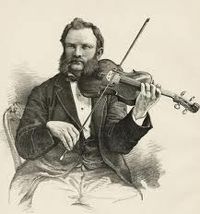Annotation:Laird o' Auchluncart (The): Difference between revisions
No edit summary |
No edit summary |
||
| Line 7: | Line 7: | ||
''It was so capacious as to hold two Customers at a time. A quaint Sign-Board, a great'' | ''It was so capacious as to hold two Customers at a time. A quaint Sign-Board, a great'' | ||
''attraction to the merchandise below, is among the things that were. It had a large '4' '' | ''attraction to the merchandise below, is among the things that were. It had a large '4' '' | ||
''painted in the centre, which | ''painted in the centre, which Symbol (cut often on Merchants' Grave-stones) indicated'' | ||
''that "Goods," never Evils, were Sold, which came from the Four Airts of the World.''<br> | ''that "Goods," never Evils, were Sold, which came from the Four Airts of the World.''<br> | ||
<br> | <br> | ||
Revision as of 06:30, 17 May 2014
Back to Laird o' Auchluncart (The)
LAIRD O' AUCHLUNCART, THE. Scottish, March (4/4 time). D Major. Standard tuning (fiddle). AABBCCDDEEFF. Composed by Scots fiddler-composer J. Scott Skinner (1843-1927).

James Frederick Skinner Gordon, in his book The Book of the Chronicles of Keith (1880) mentions the laird in this passage:
"Sanners Dow's" Shop was a Place of public knowledge at the south-west corner [in Keith]. It was so capacious as to hold two Customers at a time. A quaint Sign-Board, a great attraction to the merchandise below, is among the things that were. It had a large '4' painted in the centre, which Symbol (cut often on Merchants' Grave-stones) indicated that "Goods," never Evils, were Sold, which came from the Four Airts of the World.
The Laird of Auchluncart is reported to have sought refuge in this Warehouse, when overtaken by a pelting shower, who once and again excused his intrusion by the announcement--"I'm the Laird of Auchluncart;" when, patience having been exhausted, honest "Sanners" broke the silence and rejoined, "Weel, fa's contrin ye? Bide still far ye are; ye wid flyte wi' a truff."
Source for notated version:
Printed sources: Skinner (Harp and Claymore), 1904; p. 29.
Recorded sources:
